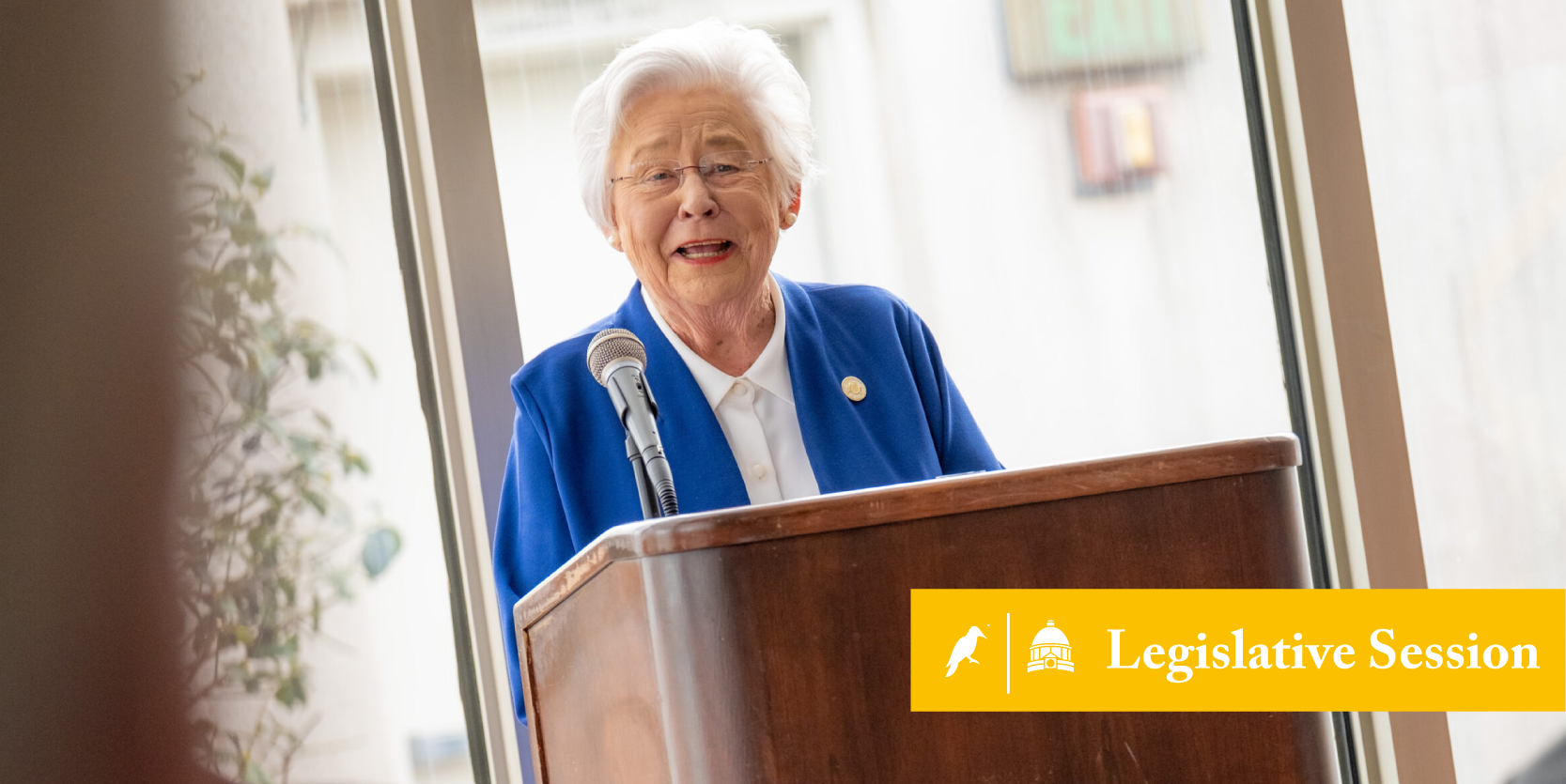MONTGOMERY — On the state level, economic development has a lot in common with competitive sports: Alabama is up against other states and the playbook matters.
Before the Alabama Jobs Act and the Growing Alabama Credit was signed into law in 2015, the state had limited incentive options to attract and secure industry developments. Local and state economic developers had to rely primarily on discretionary programs as the deciding factors for businesses who were considering locating or expanding into the state.
Eight years later, the game has changed.
“Since I’ve been governor, more than $42 billion have been invested in our state, which has created some 78,000 new jobs,” Gov. Kay Ivey said. “For most of those, we can thank the Alabama Jobs Act. And any good coach knows when you have a play that’s working, the team needs to keep running it.”
Last week, Ivey huddled with legislative and business leaders to outline the latest details of a subject that will be front and center when the Legislature returns April 4.
She was joined by Secretary of Commerce Greg Canfield, who said the 2023 incentives renewal effort will answer: “What does the economic future of Alabama need to be?”
Specifically, “What are the tools that are going to be necessary to continue this forward trajectory that we have been building for the past 10 years?”
The Jobs Act was reauthorized by the Legislature with bipartisan support in 2021, but approaches a July sunset – designed for lawmakers to assess progress and double-down on success.
“The Game Plan is a strategy for a very future-focused economic effort that involves four plays – really there are four bills,” Canfield said.

First Play: Renewing and Expanding
The Enhancing Economic Progress Act will serve as the core renewal legislation. If passed, it will extend the Alabama Jobs Act and Growing Alabama programs to continue until July 31, 2028.
It’s expected to include a provision to increase the incentive cap $25 millioin per year for five years to allow Alabama to compete for larger projects that are going to other states.
It also addresses a range of opportunities such as making renewable energy a qualifying activity and increasing the amount for site development to $35 million.
“Those two toolsets (Jobs Act and Growing Alabama) have allowed us to build historic revenues in our state’s budget, but also, more importantly, create a wealth of career-building jobs across the state, and the investment that has come with it,” Canfield said of the bill.
Second Play: Site Development
Relevant to the availability of suitable industrial parks and sites, another piece of legislation will address a vulnerability brought about by the success of recent efforts: Alabama is running out of large industrial sites.
The Site Evaluation and Economic Development Strategy (SEEDS) Act envisions a response.
Greg Barker, president of the Economic Development Partnership of Alabama, said in a guest column last month, “Every state contiguous to Alabama has either recently enacted or renewed funding for site development initiatives including Georgia, Florida, Mississippi, and Tennessee.”
“In the last six months, Kentucky announced a $100 million program for development of industrial sites, and Virginia recently announced a $90 million site development initiative,” Barker said.
The SEEDS Act would grant the State Industrial Development Authority (SIDA) additional powers to issue site assessment and development grants in an effort to increase the quality and quantity of industrial sites in Alabama.
“We want to look at the ability to add new properties and new land into the inventory,” Canfield said.
The bill is also expected to direct the creation of the Alabama Site Development fund, opening the door to funding mechanisms and streamlined partnerships with economic development organizations to implement those grants.
Lt. Gov Will Ainsworth told a panel in February, “Other states are investing a lot of money to make sure they have sites. If a company comes to Alabama and we don’t even have a site, we’re not going to be in the game.”
Third Play: Innovation and Small Business
A deepening of public-private partnerships is proposed to accelerate the scale and effectiveness of Innovate Alabama.
The Innovation and Small Business Act will attract startup technology, companies, and offer underrepresented populations the opportunity to start or expand their businesses.
In a column last week, speaking on behalf of the Innovate Alabama board, Bill Poole advocated for the provisions.
“First, the proposed Innovating Alabama Tax Credit will create a competitive incentive that will empower Alabama to meet increasing demand as new tech accelerators and programs for small, innovative businesses continue emerging across the state,” he wrote.
Expected in the bill is a scaling-back of Growing Alabama to its initial focus of site development, and the credit for accelerators will be transferred to Innovate Alabama and rebranded as the Innovating Alabama tax credit.
The legislation presents a future-focused strategy by state and regional leaders to make Alabama a top destination for innovative industries such as information technology, agriculture, biosciences, and engineering.
Fourth Play: Transparency
Another integral component to enhancing the effectiveness of the program has to do with communication and trust in publicly available information.
The Legislature has an economic incentives oversight committee to review applications, ensure jobs are delivered as promised, and track the return on investment to the state.
A bill included in the package, the Transparency in Incentives Act, would go further in disseminating that information to the public through the Department of Commerce website, Made in Alabama.
“We are so confident in the data that we see from the tools that we’re using, we know they are positive revenue performers,” Canfield said. “We know that the Alabama Jobs Act is built upon the premise that every offer we make has to be revenue positive for our state.”
Speaking to the performance-based structure of incentives afforded to companies, as outlined in the initial 2015 legislation, referred to as “pay-as-you-go” incentives, Canfield said there are clear indicators of return that everyone should be able to see.
“Companies have to invest here,” he said. “They have to create new economic activity here. They have to hire Alabamians and put them on the payroll.”
Details made available will include the names of incentivized companies, the counties of qualifying projects, the estimated capital investment, number of new jobs, and the estimated value of the return, among other features.
What’s Next
Legislators are on a scheduled break this week and set to reconvene April 4th. When they return to the Statehouse, the renewal effort is expected to take center stage.
Leaders from both parties and both chambers have expressed their support.

Grayson Everett is a staff writer for Yellowhammer News. Follow him on Twitter @Grayson270 for coverage of the 2023 Legislative Session.













